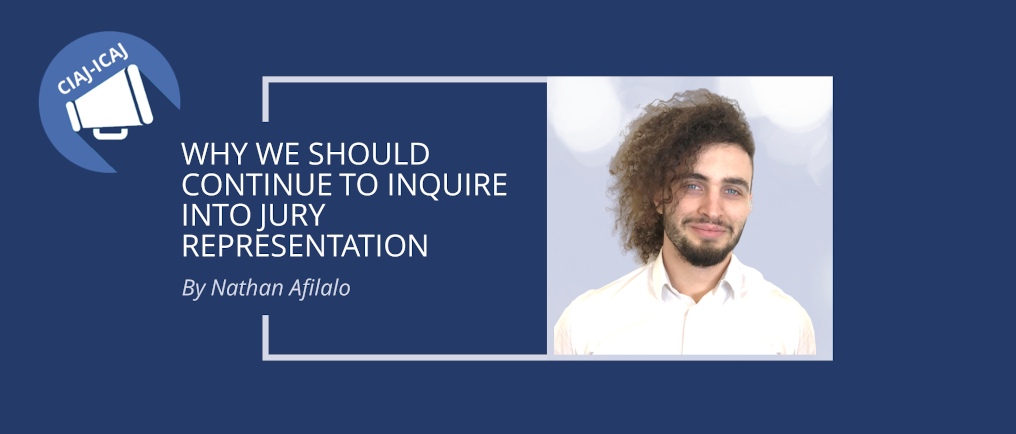Why We Should Continue to Inquire Into Jury Representation

Over the last year, CIAJ has hosted four Roundtables that brought together actors of the justice system to talk about the under-representation of Indigenous Peoples on criminal juries. The study of systemic discrimination in the context of juries and jury selection is not new, and the problem persists.[1] Despite this, the subject of who can be part of the accused’s “equals and neighbours, indifferently chosen, and superior to all suspicion”[2] to try their case was not explored as such by the Truth and Reconciliation Commission (TRC). Considering the recent developments of some of the TRC’s Calls to Actions,[3] CIAJ had to pause and ask: is it useful for the organization to focus its efforts on juries?
Over the course of the four Roundtables, a wide variety of issues were covered: the leading case on jury representation R v Kokopenace,[4] the recommendations made by the official bodies that have examined systemic bias and Indigenous representation on juries in Canada, the Gerald Stanley trial and the abolishment of peremptory challenges brought on by the recent amendments to the Criminal Code. However, each Roundtable discussion ventured beyond this well-trodden ground.
Participants considered citizenship requirements for juror service, the barriers excluding people with disabilities, whether to include Indigenous languages into the legal process,[5] the lack of state financial support and the complications of living in remote and Northern regions, Indigenous oral traditions and legal procedures, and Indigenous jurisdiction (to name a few). Taken together, the participants contextualized and discussed the wide and differing array of problems that arise in the jury selection process as symptoms of the deeper tensions between Indigenous legal orders and the Canadian legal system. At each Roundtable it was made clear: addressing problems with jury representation involves more than merely making changes to a province’s jury legislation or to the Criminal Code.
At the Calgary Roundtable, Dr. Wilton Littlechild and Dr. Reg Crowshoe both said that jury selection should not be treated as a discrete problem in the justice system. Rather, they explained, change in jury selection should be one point in a constellation of issues taken on by a holistic and systematic approach based on the principles and norms set out in texts written by Indigenous Peoples, such as the United Nations Declaration on the Rights of Indigenous Peoples (UNDRIP) and the TRC’s Calls to Action, which itself calls for the implementation of UNDRIP. These texts offer a starting point from which to reinterpret existing structures, and opportunities to develop and expand existing rights, if not create new ones altogether.
CIAJ will further the discussion on jury representation at its Annual Conference on Indigenous Peoples and the Law in Vancouver, on October 21-23, 2020, and host in 2021 a National Symposium on the subject.
[1] The under-representation of Indigenous people in Manitoba was given dedicated examination in 1991 in the Aboriginal Justice Inquiry of Manitoba. The issue was also examined in Ontario in the First Nations Representation on Ontario Juries: Report of the Independent Review Conduct by the Honourable Franke Iacobucci from 2011-2013 and from 2014-2018 by the Debwewin Jury Review Implementation Commission. There are now in 2020 calls for an inquiry into the death of Colten Boushie and the acquittal of Gerald Stanley by a jury in Saskatchewan in 2018.
[2] Commentaries on the Laws of England (1769), Book IV, at p. 343.
[3] Such as An Act Respecting Indigenous Languages which received Royal assent June 21st 2019 and responds to 3 of the TRC’s Calls to Action, namely numbers 13-15 ( see s.5(g) of the Act), as well as the publishing of the findings, Calls to Justice and final report of the MMIWG in June 2019 (the establishment of which responds to Call to Action 41), or the development of British-Columbia’s Bill 41 Declaration on the Rights of Indigenous Peoples Act also in 2019.
[4] R v Kokopenace, 2015 SCC 28 (CanLII), [2015] 2 SCR 398.
[5] See s.4(c) of the Northwest Territories’ Jury Act, RSNWT 1988, c J-2, which allows unilingual speakers of the territory’s official languages (9 of which are Indigenous languages) to serve as jurors; http://canlii.ca/t/53rj4.

